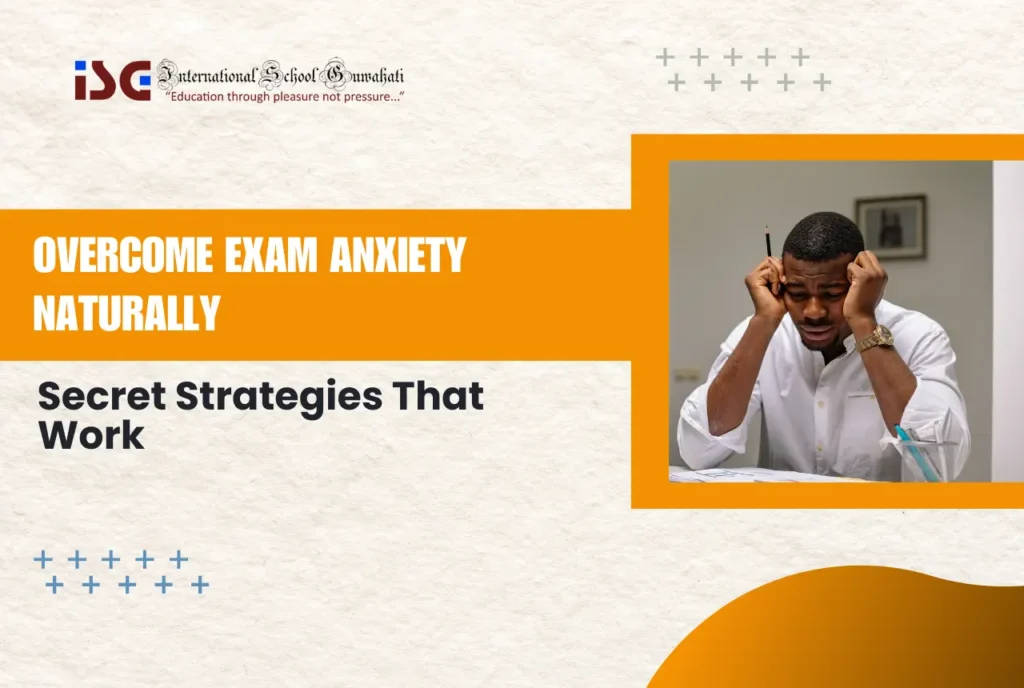![]()
Have you ever been through a scenario? You’ve put in hours of studying for your exam, but when it’s time to take it, you can’t remember anything? You can feel your hands getting sweaty, and your stomach starts to feel nervous, these feelings and signs are called anxiety. In this blog, you will find some tips to overcome exam anxiety naturally.
If you’ve had these common test anxiety signs, it’s possible that your grades and how well you do on tests don’t show what you can do. Before and during stressful tests, knowing how to deal with test nervousness healthily is important.
But before we dive into the signs and issues, let’s understand what anxiety is.
What is Anxiety?
Anxiety is a natural human emotion that causes emotions of concern, uncertainty, and unease. It can happen because of worry, trauma, some medical conditions, or medicines you take. Symptoms include shivering, sweating, pounding of the heart, and trouble breathing or focusing.
Anxiety can be managed through therapy, medication, or lifestyle changes such as exercise and relaxation techniques. It’s important to seek help if anxiety is affecting your daily life and functions.
For students feeling tense and anxious before tests is common, but there are helpful techniques to help you cope with your worry.
What is Exam Anxiety?

Examination nervousness is something that a lot of people feel before tests, exams, or performance situations. It’s a natural response that can help us stay focused and alert. Anxiety can help with studying and success, but too much of it can come in the way.
If you are too anxious, learning, remembering information, concentrating on questions, or demonstrating knowledge and skills during exams might be impossible. Although, It is possible to learn how to effectively deal with test anxiety, which is good because it can be controlled and not negatively impact performance.
What causes exam anxiety?
The elements that contribute to exam anxiety differ from person to person. This may include:
- Previous exam-related negative experiences.
- Lack of preparation or unfamiliarity with exam-taking strategies and study methods.
- Unhelpful ideas about the exam situation, oneself, or the expected results.
- Intense pressure to succeed or perfectionistic impulses.
- Fear of failing.
- Inadequate sleep, poor nutrition, lack of exercise, or relaxation are all examples of self-care neglect.
- Understanding the specific factors that influence your exam anxiety is critical for developing an effective strategy to manage it.
Let’s check some of the tips to overcome exam anxiety naturally:
Herbal remedies for exam anxiety

Herbal remedies for exam anxiety are natural products made from plants that are used to ease the stress and anxiety that come with exams. Chamomile, passionflower, lavender, and valerian root are some of the herbs that are often used for this reason. It is believed these herbs can help you relax and feel less anxious by having calming effects.
Still, it’s important to remember that herbal remedies for exam anxiety may not work for everyone or for every person who tries them. Before using herbal medicines to treat any illness, it’s always a good idea to talk to a doctor or nurse.
Natural calming techniques for exams
Studies have shown that natural calming treatments can be effective in mitigating anxiety and enhancing focus during exams. One such strategy is deep breathing exercises, which involve slow, deliberate inhalations through the nose and exhalations through the mouth, promoting relaxation through controlled breathing patterns.
Additionally, mindfulness meditation, a practice focused on anchoring your attention to the present moment and letting go of distracting thoughts, can aid in quieting the mind and managing anxiety. Furthermore, research has demonstrated that physical activity is a potent tool for stress reduction, as it triggers the release of endorphins, natural mood-elevating chemicals that can significantly improve well-being and mental clarity.
By incorporating these natural calming techniques into your exam preparation routine, you can equip yourself with valuable tools to manage anxiety and perform at your best.
Yoga poses for exam stress relief

Yoga is a great way to relax before any exam and feel better all around. Some yoga poses can help you calm down, concentrate, and feel less stressed.
Child’s Pose (Balasana), which slowly stretches the back and hips and calms the mind, is a good way to relax. Downward-Facing Dog (Adho Mukha Svanasana) strengthens the core and increases circulation, which wakes up the body and helps you concentrate. Cat-Cow Pose, also known as Marjaryasana and Bitilasana, is a yoga pose that blends slow, rhythmic breathing with gentle spinal movements. It can help you become more flexible and calm down.
Remember that yoga should be done regularly to get the most out of it and that you should always pay attention to your body and change the poses as needed. Some other things that can help you relax even more are practicing awareness and deep breathing while you do yoga.
Breathing exercises for test anxiety

Deep breathing techniques are a great way to deal with test anxiety. By taking deep breaths in through your nose, keeping them for a few seconds, and slowly letting them out through your mouth, you can make your body relax and stop your mind from racing.
Do this several times, but this time pay attention to your breath instead of your fears. Aside from that, adopting mindfulness and visualizing can also help ease test anxiety. Try to stay calm and upbeat, and know that it’s okay to be scared before a test.
Mindfulness meditation for exam nerves
One strong way to deal with the often crippling effects of exam anxiety is to practice mindfulness meditation. Focusing on the present moment and observing your thoughts and feelings without judging them is what this exercise helps you reach.
By training your attention in this way, you can get a lot of benefits that help fight the bad effects of worry. One more thing that mindfulness meditation can do is help you feel better about yourself and your tests. You can find a lot of guided meditations and other helpful information online that can help you start mindfulness meditation to calm down before a test.
Summing it up
Anxiety before a test indicates the importance you place on the outcome. Despite this awareness, it might be difficult to relax and manage a racing heart and sticky palms. Allocating enough time for studying and getting a good night’s sleep beforehand can help reduce anxiety and prepare you to take the test confidently.
If test anxiety continues to interfere with your ability to complete exams, obtaining professional help may be beneficial. A trained therapist can offer specific coping skills to help you handle test anxiety.







